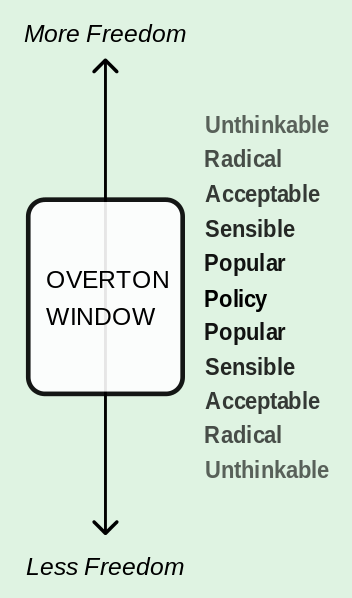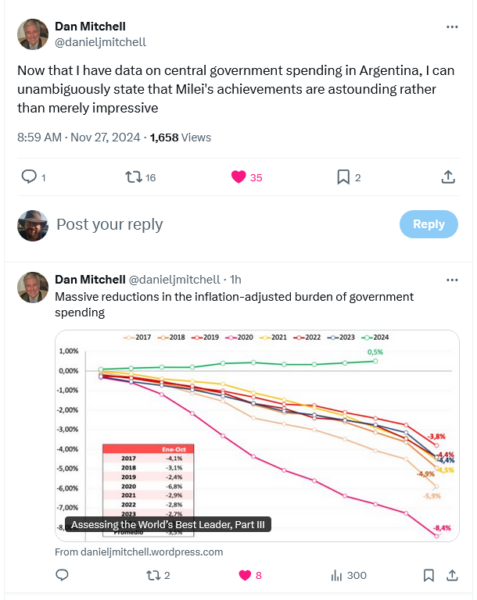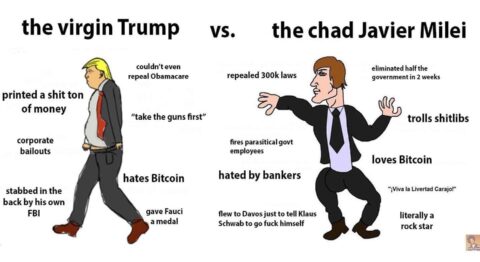Lots of comments by and for Canadians in the last few weeks have been of the “running around with hair on fire” school of journalism. Donald Trump has transmogrified from the butt of jokes to the embodiment of everything technocratic Canadian “elites” fear:

Diagram of the “Overton Window”, based on a concept promoted by Joseph P. Overton (1960–2003), former director of the Mackinac Center for Public Policy. The term “Overton Window” was coined by colleagues of Joe Overton after his death. In the political theory of the Overton Window, new ideas fall into a range of acceptability to the public, at the edges of which an elected official risks being voted out of office.
Illustration by Hydrargyrum via Wikimedia Commons
The re-election of Donald Trump has masked a growing and profound shift in American politics, and ushered in a new era of Republicanism in the United States. Trump’s return is seen by many to be an isolated incident, an aberration from previous conventional norms and one that will resolve once the man himself is gone from power or from this earth.
For these people, the issue is Trump and Trump alone.
I believe that this is a profound misunderstanding of what is happening in America today, and what the future holds.
The old Republican party is gone. In its place is a movement that is built on the foundations of 19th century expansionism; strength and self-interest. It is motivated to settle grievances against the post-war consensus conservatism that it blames — more than it even blames the left — for the decline of the once-mighty American empire. For the New Republican, Ronald Reagan and George W. Bush were as much responsible as Bill Clinton and Barack Obama in ushering in America’s decline.
Donald Trump is the transitionary vessel to carry that movement forward. He is the tip of the spear whose job is to crack open the institutions that the New Republican believes poisoned America for decades. Overton’s Window is wide open for the New Republican now.
It is useful to start with describing the New Republican movement. It is not the previous Republican movement of lower taxes, less state intervention or smaller government. These things may also be part of Trump’s movement, or at least a slice of it, but those are the beliefs of yesterday’s Republicans. Today’s ideology happens to dovetail well into the libertarian beliefs of the tech bros led by Elon Musk. Trump and Musk’s bromance is premised on some shared affection for each other as strong businessmen and leaders. But the alliance is shaky. Libertarian Republicans are only being tolerated by the larger movement because it’s useful in tearing down the structures the New Republican wishes to rebuild.
[…]
The New Republican is a value proposition. He rejects the very notion of normative values, that some countries may have values that are different, and which are to be tolerated even though they may be counter to American interests. There is no space for these values for the New Republican. The New Republican believes American values are superior and should be exported to the world. These values include family, fortitude, hard work, God, self-interest, the proper roles of the (two) sexes and especially, strength. That these values are the “right” values is self-evident to the New Republican, who believes that they should also be for everyone else.
Who are the New Republicans? One should look to Trump’s choices for cabinet — J.D. Vance, Marco Rubio and Howard Lutnick are good places to start. They all figure to be around — and in control of the party apparatus — once Trump is gone.
Elon Musk is not one of these people. Like Trump, he is the pointy end of a spear, and when the falling out between him and the New Republicans happens, it will not be pretty.
Finally, the New Republican is a lot of Americans. More than many would like to believe.














